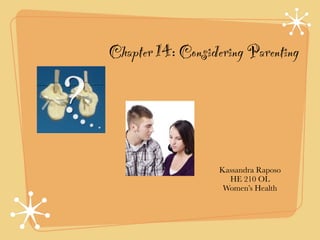
Women's health teachback
- 1. Chapter 14: Considering Parenting Kassandra Raposo HE 210 OL Women’s Health
- 2. Unlike today, years ago, things like the lack of contraceptives and also societal expectations of women, meant that all women who were fertile were expected to have children. Now a days, things are different. There are several factors like birth control and abortions for example, that give women the option to whether or not they want children.
- 3. Content - Things to consider - Age & Fertility - Influences on your choice - Deciding not to have a child - Trying to Conceive - Adoption
- 4. Things to consider When thinking about becoming a parent, there are several things you and your partner should consider : - Having a stable job - Do you have a stable household? - Any household members/partner abusive in any way? (physically/verbally abusive, alcohol/drug abuse) - Family medical problems that could be passed down to the child - Juggling work and child care - If single, would a child affect any new intimate relationships? - Having health care insurance - What kind of community would you like to raise this child in? - Would you have support if you or your child developed a disability? - Age (too young, too old)
- 5. Age & Fertility Today, women are beginning to have children at older ages because of career, educational opportunities and economic concerns. 1 in 5 women in the United States are having their first child at 35 years old. There are reasons as to why this could be a problem : - A 25 year old has about a 25% chance of becoming pregnant but this percentage begins to drop in the late 20’s and decreases. By age 40, they have about a 5% chance of conceiving per cycle - A younger women is more likely to get pregnant in fewer cycles - The older you are not only can give you trouble to conceive, but also to carry to full term - Chromosomal abnormalities, (the cause of more than half of all miscarriages) are more likely as we age - A 25 year old has a 12-15% chance of miscarriage each time she becomes pregnant, while a woman in her 40’s has a 50% chance There are many women who do get pregnant in their 30’s and 40’s and have no problem at all but as we get older there are more risks and chances of miscarriages and abnormalities. Something to keep in mind.
- 6. Influences Many influences can affect your decision on having a baby. It is important to make sure it is the right time for you and your significant other, or whether you even want to have a child or not. - Many women let nature decide by not using contraception - Your parents may be pressuring you to have babies - The friends you surround yourself with may have children, so you are feeling the pressure. - Your own partner may pressure you into it and you may feel you are forced to in fear they will leave you if you do not - Worrying that you won’t be a good parent may also affect your choice on deciding on whether or not to become a parent
- 7. Deciding not to have a child Striking Quote “Once my husband and I had been married a few years, there were constant questions about when we would start a family - particularly from or parents, whose friends were all grandparents. Then there was additional pressure when our friends were all having children - this changed the dynamics of our friendships and was an unexpected result of deciding not to have children”. - In my opinion, family and friends should leave this sensitive subject alone. When the couple is ready, they will come forward with the news that they are trying to conceive. Little do friends and family know, they could have been having trouble conceiving and were - Our culture sees that having a child is trying different options. After the hassling and a part of being a woman. Many people hounding, the dynamics of their friendships had assume that a woman cannot feel truly changed and they decided to not have children. fulfilled if they have not experienced Maybe they felt too pressured and fed up and gave up being a mother. Many women who on the whole baby situation. choose to not have children seek support groups who support their decisions.
- 8. Trying to Conceive Once deciding to get pregnant, charting your menstrual cycle will make it easier for women to learn about their “fertility” signals and increase their chances of getting pregnant. Another good thing to do is meet with your health care provider. They will help you learn about how to prepare for pregnancy. If conceiving seems troublesome, there are also other options like adoption that will be discussed on the next slide.
- 9. Adoption If unable to conceive, or have a medical condition that makes it unsafe for childbirth, or simply choose not to become pregnant, adoption is something that can be considered. - Adoption is definitely something expensive. To help, federal government provides a tax credit of up to $13,170 per child. - Women entering parenthood through adoption need just as much support as a women carrying her own child.
- 10. Question of the Chapter: What is your opinion on family and friends pushing the issue of having a child onto a couple?
Editor's Notes
- \n
- \n
- \n
- \n
- \n
- \n
- \n
- \n
- \n
- \n